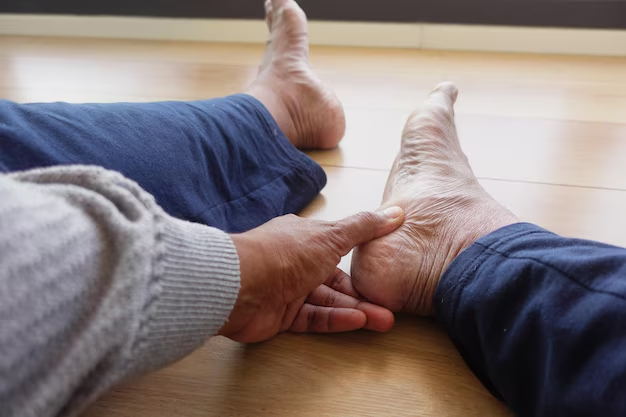Your Guide to Does Medicare Cover Ankle Surgery Recovery At Home
What You Get:
Free Guide
Free, helpful information about Medicare Insurance and related Does Medicare Cover Ankle Surgery Recovery At Home topics.
Helpful Information
Get clear and easy-to-understand details about Does Medicare Cover Ankle Surgery Recovery At Home topics and resources.
Personalized Offers
Answer a few optional questions to receive offers or information related to Medicare Insurance. The survey is optional and not required to access your free guide.
Does Medicare Help with Ankle Surgery Recovery from Home? Here’s What You Need to Know
Facing ankle surgery often brings up concerns not just about the procedure itself, but about the recovery that follows, particularly if you’re hoping to recuperate at home. For many, Medicare coverage can play a pivotal role in determining how well-supported they’ll be during this phase of their healing journey.
Understanding Medicare Coverage for Home Recovery
Medicare Part A generally covers inpatient hospital care. However, when it comes to home recovery, what you’re looking for falls under Medicare Part B. Part B provides coverage for certain medically necessary services you receive from a healthcare professional outside of the hospital. This includes physical therapy and occupational therapy, which are vital parts of post-surgery recovery.
To qualify for home health coverage under Medicare, your doctor must certify that you’re homebound and need skilled care. Furthermore, the services have to be provided by a Medicare-certified home health agency.
Here's what may be covered:
- Part-time skilled nursing care
- Physical therapy, occupational therapy, and speech-language pathology services
- Medical social services
- Part-time home health aide care
It’s vital to confirm that the agency you choose is Medicare-approved, as this is a prerequisite for coverage. Keep in mind that Medicare does not cover 24-hour-a-day care at home, meals delivered to your home, or custodial or personal care when it’s the only care you need.
If It's Not Covered, What Are Your Financial Options?
If some elements of your recovery aren’t covered by Medicare or you face significant co-pays or other out-of-pocket costs, you might feel the pinch financially. Luckily, there are several financial assistance options to explore.
- Medicaid: If you qualify, Medicaid might pick up where Medicare leaves off, offering additional support for home care services.
- State-specific programs: Each state offers various programs that provide financial aid and support for those recuperating from surgeries.
- Charitable organizations: Certain non-profits offer grants to cover medical expenses not covered by insurance.
Enhancing Financial Health During Recovery
While navigating the intricacies of Medicare can seem daunting, focusing on financial wellness during this recovery period is essential. Here’s how:
- Credit Counseling: Taking part in a reputable credit counseling service can help you manage medical debts that might arise during your recovery.
- Education Grants: Consider utilizing any unexpected downtime to enhance your skills or knowledge. Financial aid for education could open up future opportunities.
- Personal Loans or Credit Card Solutions: For those ineligible for Medicare or Medicaid, flexible loan or credit solutions provide another path to manage expenses without excessive stress.
Essential Takeaways and Resources
To navigate your recovery both physically and financially, consider these key services and programs:
- Medicare Coverage: Verify coverage under Parts A, B, and potentially D if prescribed medications are part of your recovery.
- Medicaid and State Programs: Check eligibility for additional coverage that supplements Medicare.
- Assistance Options: Reach out to charitable organizations and look into other financial aid programs.
- Debt Management: Explore credit counseling to keep debt under control during recovery.
🔹 Medicaid: State-specific aid for additional home care.
🔹 Charitable Organizations: Aid grants for medical expenses.
🔹 Credit Counseling: Guidance to manage medical debts.
🔹 Education Grants: Utilize downtime for educational growth.
🔹 Personal Loans: Flexible financial solutions when insurance falls short.
Understanding your options and resources can help ensure that your recovery at home is both physically successful and financially manageable. Explore the paths that can offer relief and embrace the resources available to support your journey back to health.
What You Get:
Free Medicare Insurance Guide
Free, helpful information about Does Medicare Cover Ankle Surgery Recovery At Home and related resources.

Helpful Information
Get clear, easy-to-understand details about Does Medicare Cover Ankle Surgery Recovery At Home topics.

Optional Personalized Offers
Answer a few optional questions to see offers or information related to Medicare Insurance. Participation is not required to get your free guide.


Discover More
- Am I Elgible For Medicare
- Am I Enrolled In Medicare
- Am I Qualified For Medicare
- Are Adult Diapers Covered By Medicare
- Are Chemotherapy Drugs Covered By Medicare Part d
- Are Colonoscopies Covered By Medicare
- Are Covid Tests Covered By Medicare
- Are Cpap Machines Covered By Medicare
- Are Cpap Supplies Covered By Medicare
- Are Dental Implants Covered By Medicare
